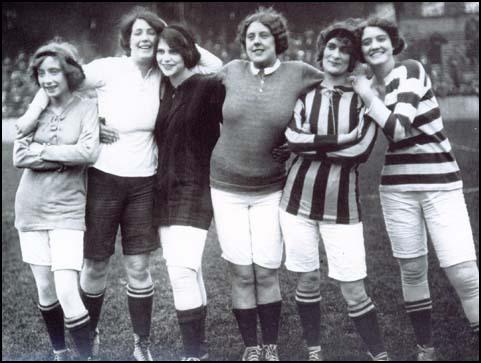The first women's football teams in Britain
One of the first records of a women's association football match being played in Britain is a game billed as Scotland v England held at Edinburgh’s Hibernian Park on 9 May 1881.

British Ladies' Football Club North team
In 1894, medical professionals called for girls and women to be banned from playing football, deeming it unsuitable for women's health.
In the same year, Nettie Honeyball (a pseudonym, real name possibly Mary Hutson) placed newspaper adverts recruiting players for a women's football team. Thirty women responded, and in 1895, the British Ladies' Football Club (BLFC) was formed.

Poster for the first match of the BLFC
Nettie, who became team captain, described football as "a manly game that could be womanly as well". She was aware of the political implications of challenging boundaries, saying:
"There is nothing of the farcical nature about the British Ladies' Football Club. I founded the association late last year, with the fixed resolve of proving to the world that women are not the 'ornamental and useless' creatures men have pictured. I must confess my convictions on all matters, where the sexes are so widely divided, are all on the side of emancipation, and I look forward to the time when ladies may sit in Parliament and have a voice in the direction of affairs, especially those which concern them most."

"There is no reason why football should not be played by women, and played well too, provided they dress rationally and relegate to limbo the straitjacket attire in which fashion delights to attire them.”
The club's first public match was held on 23 March 1895 in Crouch End, London. Teams representing 'The North' and 'The South' played in front of an estimated crowd of 11,000, with 'The North' winning 7–1. Helen Graham Matthew was known to have played for the BLFC in 1895.
Helen Graham Matthew, a Scottish suffragette, formed Mrs Graham's XI, a team that toured Britain from 1895 to 1896, as an offshoot of the British Ladies' Football Club. She was known by the pseudonym Mrs Graham as a safety measure. Women playing football were subject to harassment, and many players assumed pseudonyms to protect their identities.

Newspaper depiction of the first BLFC match
The popularity of women's football grew during the First World War when more women entered the workplace, taking on jobs traditionally held by men.
Following newspaper criticism of the shortage of artillery shells, David Lloyd George became Minister of Munitions and introduced new initiatives to improve production levels. He encouraged women to register for war work, and thousands volunteered, many employed in munitions factories across the country. These women became known as the Canary Girls as prolonged exposure to the chemical TNT turned their skin a lurid yellow colour.
Dick, Kerr and Company, a locomotive and tramcar manufacturer, was one of many businesses that switched factory production to supply ammunition during the war. In October 1917, during a period of low production in its Preston factory, women workers joined apprentices in the yard to play informal football matches during breaks.
After beating the men, the women formed the famous Dick, Kerr Ladies football team. On Christmas Day 1917, Dick, Kerr Ladies defeated the Arundel Coulthard Factory 4–0 in front of an estimated 10,000 spectators.

However, there were those who opposed women’s football and not just on sexist grounds. Women’s games were often played for charitable causes, whereas the men’s game was generally commercial, bringing in revenue for the Football Association (The FA).
On 5 December 1921, the FA banned women from playing on FA-affiliated pitches, encouraging associated clubs “to refuse the use of their grounds for such matches." They stated, “the game of football is quite unsuitable for females and ought not to be encouraged.”
This ban remained in place for 50 years.
This year, the 2021 Vitality Women’s FA Cup Final will celebrate 50 years of the competition. It will take place at Wembley Stadium on Sunday 5 December, 100 years since the ban was introduced.
Kelly Simmons, FA director of the women’s professional game, said: “To mark the competition’s 50th anniversary, we felt it was fitting to schedule the 2021 Vitality Women’s FA Cup Final on 5 December, a date which represents the game’s lowest ebb for many.
We want to use the Cup Final day, always one of the most special in the calendar, as a platform to celebrate the game’s historic trailblazers, who we remain forever indebted to, while also acknowledging the growth and development in the modern era."

